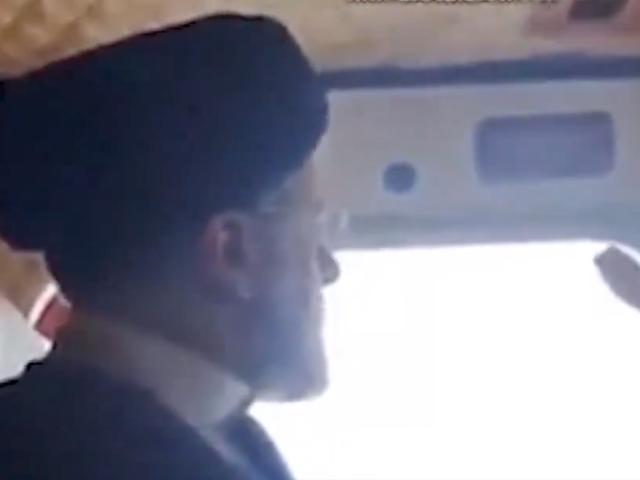In a dramatic and potentially game-changing event, Iran's semi-official ISNA news agency has released gripping footage showing rescue crews racing through a fog-blanketed, rugged forest to reach the crash site of a helicopter carrying Iranian President Ebrahim Raisi. The helicopter, believed to have suffered a catastrophic crash, was on a perilous journey in Iran's East Azerbaijan province.
The exact location of the crash remains shrouded in mystery. Initial reports indicated it occurred near Jolfa, a border city with Azerbaijan, approximately 600 kilometers (375 miles) northwest of Tehran. Later updates placed it near the village of Uzi, but the conflicting details only add to the chaotic nature of this high-stakes incident.
First reports coming in that Raisi did not survive the crash. These are unconfirmed.
— Jonathan Schanzer (@JSchanzer) May 19, 2024
Traveling with Raisi were key figures in Iran's power structure, including Foreign Minister Hossein Amirabdollahian, the governor of East Azerbaijan province, and several other high-ranking officials and bodyguards. This has raised the stakes dramatically, as the fate of some of Iran's most influential leaders hangs in the balance.
A local government official, speaking to an Iranian newspaper, described the incident as a "crash," though he admitted he had not yet reached the site. The Iranian state media, including IRNA and state TV, have remained tight-lipped about Raisi's condition, adding to the suspense and uncertainty.
Iranian regime appears to be preparing the public for the worst here... https://t.co/0Pebwo9zoi
— Jonathan Schanzer (@JSchanzer) May 19, 2024
Interior Minister Ahmad Vahidi, in a statement aired on state TV, confirmed the gravity of the situation. "The esteemed president and his entourage were returning in helicopters when one was forced to make a hard landing due to severe weather and dense fog," Vahidi said. "Various rescue teams are en route, but the harsh weather conditions and the rugged terrain are significant obstacles. We are awaiting more detailed reports from the rescue teams."
The challenging weather conditions, including heavy rain, fog, and wind, have severely hampered rescue efforts. The area, described by IRNA as a "forest," is known for its mountainous and treacherous terrain, making the rescue operation even more complex.
#BREAKING A chopper carrying Iran's President Ebrahim Raisi and his Foreign Minister @Amirabdolahian has been involved in an "incident" in Jolfa region, northwestern Iran, according to Iranian media reports.
— Iran International English (@IranIntl_En) May 19, 2024
A deputy provincial governor general says the chopper has crashed, and… pic.twitter.com/B38S8XRcwE
Iran's helicopter fleet, already strained by international sanctions that limit access to spare parts, primarily consists of aging aircraft from before the 1979 Islamic Revolution. This incident starkly highlights the vulnerabilities in Iran's aviation capabilities.
Implications for Iran's Support for Terror Groups
The potential death or incapacitation of President Ebrahim Raisi could send shockwaves through Iran's political and military establishment. Raisi, a hardline cleric, has been a staunch supporter of Iran's aggressive foreign policy, including its backing of terrorist organizations targeting Israel.
If Raisi were to be confirmed dead or severely injured, it could lead to a significant power vacuum and a period of instability within Iran. Such a scenario might disrupt the chain of command and operational coherence of Iran's support for groups like Hezbollah and Hamas. These groups rely heavily on Iranian funding, training, and logistical support to sustain their activities against Israel.
🚨🇮🇷 BREAKING: IRAN HOLDS AN EMERGENCY SECURITY MEETING
— Mario Nawfal (@MarioNawfal) May 19, 2024
An emergency meeting of the Supreme National Security Council was held in the presence of Ayatollah Khamenei.
This follows the helicopter carrying President Ebrahim Raisi, which made a "hard landing" due to fog around… https://t.co/PR1WYQZE3l pic.twitter.com/rf48zFFwyk
Moreover, the leadership struggle that would likely ensue in Tehran could see factions vying for control, potentially leading to shifts in policy and priorities. Some factions might push for a more aggressive stance, while others could advocate for a strategic retreat to consolidate internal power. This uncertainty could temporarily weaken Iran's ability to project its influence through proxy groups, offering Israel a brief respite from the constant threat of Iranian-backed terrorism.
However, it is equally plausible that Iran's Revolutionary Guard Corps (IRGC), known for its resilience and ideological commitment, could double down on its efforts to support terrorist activities as a means of rallying nationalist sentiments and maintaining control amidst chaos.
BREAKING:
— Visegrád 24 (@visegrad24) May 19, 2024
Iran's President Ebrahim Raisi likely dead after helicopter crash in Azerbaijan pic.twitter.com/Cp97eSC56f
In either scenario, the implications of Raisi's potential demise are profound. The world watches with bated breath as the rescue efforts continue, knowing that the outcome could reshape the geopolitical landscape of the Middle East. The fate of President Raisi may very well determine the next chapter in the ongoing conflict between Iran and Israel.


